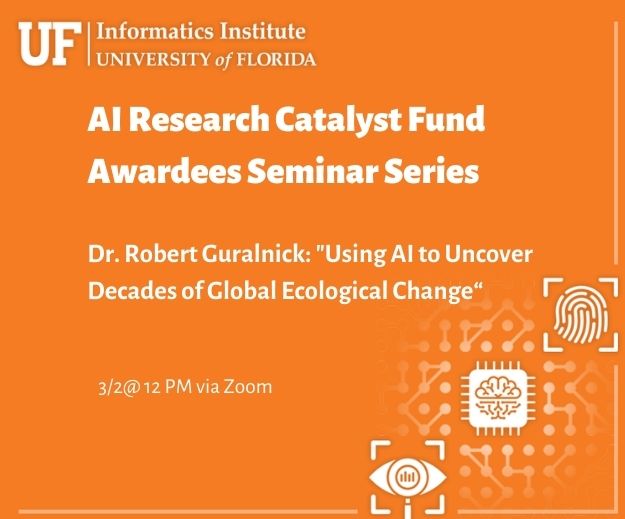AI Research Catalyst Fund Awardees Virtual Seminar Series – Dr. Robert Guralnick

- This event has passed.
AI Research Catalyst Fund Awardees Virtual Seminar Series – Dr. Robert Guralnick
March 2, 2022 @ 12:00 pm - 1:00 pm

AI Research Catalyst Fund Awardees Virtual Seminar Series
“Using AI to Uncover Decades of Global Ecological Change“
by Dr. Robert Guralnick, Curator, and Dr. Raphael LaFrance, Information Technology Expert, Florida Museum of Natural History
Wednesday, March 2, 2022
ABSTRACT:
Plant phenology — the seasonal timing of when plants develop leaves, flowers and fruit — is highly sensitive to environmental change. Plant phenological data are therefore essential for understanding and forecasting ecosystem responses to climate and land use changes. We will use a suite of artificial intelligence techniques to extract and mobilize new phenological information from the millions of historical plant specimen images currently available at UF through the iDigBio specimen digitization project (https://www.idigbio.org/). Data from this project will provide vital historical baselines for forecasting long-term ecological and biodiversity trends, with impacts on both conservation and agriculture. This work will also establish a foundation for building new research infrastructure for generating, integrating, and delivering plant phenological data.
Bio:
In his role as the Florida Museum’s curator of biodiversity informatics, Dr. Robert Guralnick uses an understanding of evolutionary processes to help create a roadmap for the future of life on Earth. By digitizing natural history collections and synthesizing massive datasets in accessible ways, he deepens scientific understanding of changes in biodiversity over space and time. These big data approaches allow researchers to answer broadscale questions about climate change, evolution and biology.
Raphael LaFrance is a systems architect at the Florida Museum of Natural History, where he develops software in support of bioinformatics and biodiversity research as well as software to help with the digitization and data mining of natural history collections. He has a strong interest in using commodity hardware to develop and use artificial intelligence to mine natural history collections.
Wednesday, Mar. 2, 2022
12:00PM – 1:00PM
Via Zoom

